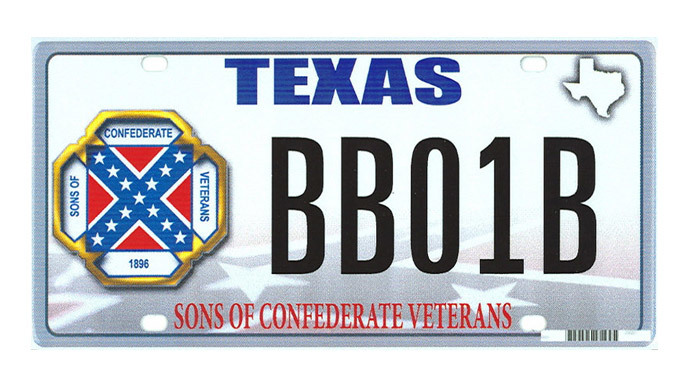Confederate flag battle reaches Supreme Court

Texas and a Confederate memorial society have squared off in the US Supreme Court, arguing over whether states have the right to ban specialty license plates they deem offensive. They also differ about how to view a war that ended 150 years ago.
In 2010, citing a policy of refusing any design that “might be offensive to any member of the public,” the board of the Texas Department of Motor Vehicles rejected a proposed design of specialty license plates by the Sons of Confederate Veterans (SCV).
“A significant portion of the public,” the DMV explained at the time, “associates the Confederate flag with organizations advocating expressions of hate directed toward people or groups that is demeaning to those people or groups.”
Is A Confederate Flag License Plate Free Speech? | http://t.co/8GMavL5eJx#Mind
— Spasique (@Spasiques) March 23, 2015
Like most US states, Texas provides custom license plates for an additional fee, but the designs have to be approved by the state board governing the DMV. According to the SCV, Texas had never rejected a license plate design before.
Lawyers for the SCV have pointed out that Texas has a policy of honoring Confederate veterans, from battle re-enactments on state capitol grounds and monuments to Confederate veterans, to Confederate Heroes Day (a state holiday) and Confederate flags being sold at the Capitol gift shop. Attorneys for Texas countered that those were different flags: the “national” banners of the Confederacy as opposed to the “battle flag.”
“Why would African Americans want to be reminded of a legalized system of involuntary servitude, dehumanization, rape and mass murder?” Royce West, a black Texas Democratic state senator, asked in 2011.
Oh so Kanye West can wear a confederate flag on his jacket but when I do I'm "racist" & "inconsiderate" pic.twitter.com/V3KEvKQPuf
— jåke (@jwalt96) March 23, 2015
Defenders of the flag have argued it represents historical heritage, not hatred. Southern rock band Lynyrd Skynyrd defended their use of the flag in 2012.
“The Confederate flag means something more to us, Heritage not Hate,” wrote band member Gary Rossington, adding the group also uses the flags of Alabama and the US in its shows, “because at the end of the day, we are all Americans.”
Post by Lynyrd Skynyrd.
In its brief to the Supreme Court, the American Civil Liberties Union agreed the battle flag was controversial: a “banner for those who supported slavery and sought to break our nation apart,” and later a “rallying sign for those seeking to maintain racial separation in all facets of life, from the voting booth to the wedding chapel.”
“However reasonable this distaste for a symbol of racism, the Constitution does not permit the state to discriminate against messages in a forum it has created for private speech,” the ACLU brief stated.
Whether specialty license plates are state speech or state-enabled private speech is what the Supreme Court will have to decide in Walker v. Sons of Confederate Veterans. Federal courts, such as the Fifth Circuit, have so far ruled specialty license plates were private speech, siding with the SCV.
The last time the Supreme Court addressed license plates in a First Amendment context was 1977’s Wooley v. Maynard, when it ruled that New Hampshire had no right to ban plates with the state motto (“Live Free or Die”), following objections from Jehovah’s Witnesses.
The Supreme Court has also previously ruled that any action involving the US flag is protected under the First Amendment.
Any action taken involving an American flag, whether you agree with it or not, is protected under 1st Amendment. SCOTUS affirms. #UCIrvine
— James Brickhouse (@JustABrick) March 7, 2015
Due to confusion between the early Confederate and US flags in the first battle of the American Civil War (1861-65), a Virginia general proposed a “battle flag” that would enable his soldiers to “know our friends from our enemies.”
The original design featured a blue St. George’s cross on a red background, with white stars representing the thirteen states of the Confederacy. Out of consideration for Jews and some Protestants, the design was changed to the diagonal (St. Andrew’s) cross. The square banners were issued to the Army of Northern Virginia in November 1861, and were in use till Robert E. Lee’s surrender at Appomattox on April 9, 1865.
The “battle flag” currently appears on license plates in Alabama, Georgia, Louisiana, Maryland, Mississippi, North Carolina, South Carolina, Tennessee and Virginia.












